CAFNR
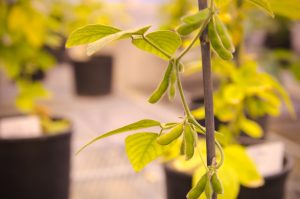
Feb. 17, 2020
An Important Comparison
It was nearly a decade ago when the first soybean reference genome, “Williams 82,” was published in 2010. For the next several years, that cultivar, which was chosen to represent the northern United States germplasm, served as the main soybean reference genome – the sequence that gives scientists a baseline of a species’ set of genes. A few years after “Williams 82” became available, Henry Nguyen, Curators’ Distinguished Professor of Plant Sciences in the University of Missouri College of Agriculture, Food and Natural Resources (CAFNR), was part of a team that developed additional reference genomes, this time focusing on soybeans…
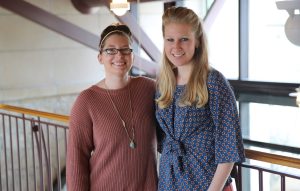
Feb. 13, 2020
Strengthening CAFNR Communication
The University of Missouri College of Agriculture, Food and Natural Resources (CAFNR) Office of Marketing and Communications recently added two individuals to its team – Reagan Brown and Ashley Craft. Brown has been named the CAFNR marketing communications coordinator. Craft’s new role is as the Extension communications strategist. “We are so excited to add Reagan and Ashley to our team,” said Michelle Enger, director, CAFNR Office of Marketing and Communications. “Both bring unique skillsets and experiences that will help us expand how we talk about the outstanding things happening in CAFNR.” Showcasing Missouri Agriculture Brown joins CAFNR after spending the…

Feb. 12, 2020
Celebrate CAFNR’s 150th Anniversary
It’s a big year in CAFNR! We are proud to be observing the 150th anniversary of the College of Agriculture, Food and Natural Resources in 2020. Make plans to join us in celebrating the golden legacy and bold future of our college. Save the date to join us for the CAFNR Founding Day celebration, Monday, Feb. 24. We will have a special proclamation ceremony in the Jesse Hall rotunda at 1:30 that afternoon. This event will mark 150 years to the day of our founding in 1870. Speakers will include Missouri Lt. Gov. Mike Kehoe, who will also read a…

Feb. 4, 2020
Building a Network
As the director of career services in the CAFNR Office of Academic Programs, Matt Arri dedicates his time to building networks and relationships between CAFNR students and industry professionals. Arri’s goal is to make sure those students are career ready – and he has introduced a variety of new initiatives to help them along the way. It was an alum who helped set up the most recent Agribusiness Career Connections Program trip. Craig Bacon, senior vice president of technical services for Simmons Prepared Foods, was part of CAFNR’s Robert O. Reich Executive-in-Residence Program in October 2018. Bacon returned to campus…
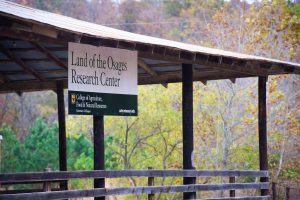
Jan. 29, 2020
A Humble Giver
Sarah Lovell officially joined the University of Missouri College of Agriculture, Food and Natural Resources (CAFNR) in August 2019, as the H.E. Garrett Endowed Chair Professor and director of the Center for Agroforestry. Two months later, Lovell, who became just the second individual to hold the endowed chair position after Shibu Jose served eight years in the role, welcomed guests to the grand opening celebration of the Land of the Osages Research Center. Neither the H.E. Garrett Endowed Chair Professorship nor the Land of the Osages Research Center would have come to fruition if Gene Garrett would have ignored a…
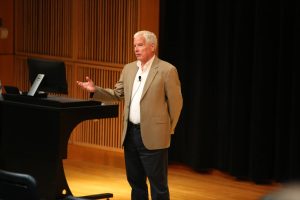
Jan. 29, 2020
A Great Experience
J. Scott Angle never intended to have a career in agriculture. An interest in golf led Angle to turf management (agronomy) at the University of Maryland. The agronomy degree program was in the College of Agriculture and Natural Resources at the University of Maryland. “I had no interest in agriculture,” Angle said. “I grew up in the city, in Baltimore, and I didn’t really have any ties to agriculture. I did love golf and was focused on becoming a golf course superintendent. It just so happened that turf management was part of the agriculture college at the University of Maryland.”…

Nov. 22, 2019
Growing CAFNR’s Research Footprint
It was 10 years ago when Shibu Jose joined the University of Missouri College of Agriculture, Food and Natural Resources (CAFNR) as the H.E. Garrett Endowed Chair Professor in the School of Natural Resources (SNR) and the director of The Center for Agroforestry. During the past year, Jose has served as the interim associate dean for research in CAFNR and director of the Agricultural Experiment Station (AES), CAFNR’s network of research centers throughout the state. The interim tag has now been officially removed. Jose’s appointment as associate dean for research and director of the AES is effective immediately. Jose became…
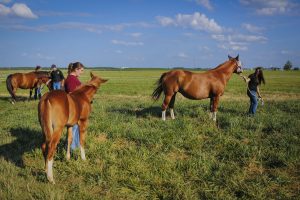
Nov. 14, 2019
Learning by Doing
Experiential learning is embedded throughout MU’s College of Agriculture, Food and Natural Resources courses. From Cafe at Eckles, a café operated by students and faculty of the hospitality management program, to Tiger Garden, a student-operated florist shop, there’s no shortage of opportunities for CAFNR students to gain valuable work experience. The Division of Animal Sciences recently added an Equine Science and Management Certificate, a program that will allow students to emphasize and quantify to employers their hands-on work experience with horses. “This certificate focuses on hands-on experience,” said Marci Crosby, an instructor within animal sciences and the coordinator of the…

Nov. 11, 2019
Teaching Excellence
The son of junior high school teachers, it was only natural that John Tummons would eventually find himself in a classroom setting, empowering and equipping students to make a positive impact throughout the world. Tummons knew where he wanted to make that impact, too. Tummons earned his bachelor’s degree in agricultural education from the University of Missouri, and it was while he was working toward his degree that he made a decision – he wanted to return to his alma mater as a professor. Now, 20 years later, Tummons is being honored on a national stage for his devotion to…

Nov. 4, 2019
A Grand Celebration
The University of Missouri’s College of Agriculture, Food and Natural Resources (CAFNR) celebrated the grand opening of the new Land of the Osages Research Center on Tuesday, Oct. 29. The center will further research in agroforestry, a sustainability-focused system that combines trees and shrubs with crops — and sometimes livestock — to be managed on the same piece of land as a single ecosystem. Chancellor Alexander Cartwright spoke during the opening festivities about how the new center will impact the surrounding communities in the Lake of the Ozarks area. “The Land of the Osages Research Center will bring more transformative…